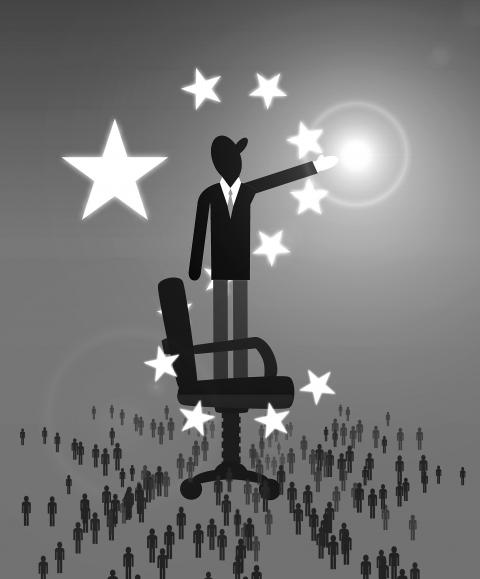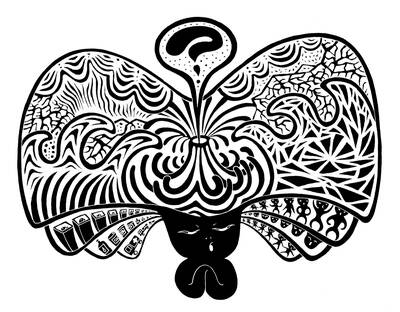The scene at a dusty Inner Mongolia military base on July 30 provided evidence of Chinese President Xi Jinping’s (習近平) consolidation of political power, even as he faces pushback from some quarters in his Chinese Communist Party (CCP) ahead of a critical gathering next month.
Dressed in army fatigues, Xi reviewed a military parade to mark the 90th founding anniversary of the People’s Liberation Army (PLA). Breaking with precedent at such events, Xi — who is head of the party and the military, as well as president — did not share the stage with peers or party elders.
PLA General Fan Changlong (范長龍), in a further departure from the norm, hailed Xi as lingxiu (領袖, leader), a reverent honorific bestowed only on two others since the 1949 founding of the People’s Republic of China: Mao Zedong (毛澤東) and his short-lived successor, Hua Guofeng (華國鋒).

Illustration: Yusha
According to six sources with ties to the leadership, as well as Chinese analysts and foreign diplomats, that display and others sent a clear signal of his increasingly dominant position in the run-up to the party’s congress starting on Oct. 18, a meeting that is only held once every five years.
University of Oxford China Centre director Rana Mitter said the lingxiu title suggests that Xi had succeeded in one of his key aims to “centralize as much authority and charisma under his own person” as possible.
However, as Xi’s supporters promote his agenda, some party insiders, wary that he will accumulate too much power and effectively end three decades of collective leadership, have delayed agreement on who will end up on the party’s Standing Committee, the apex of power, currently made up of seven men.
“There is opposition to Xi getting too much power,” a source with ties to the leadership said.
The Chinese State Council Information Office, which doubles as the party’s spokesperson’s office, did not respond to a request for comment.
As is typical in the run-up to the congress, competing name lists have been circulating in leadership circles for the Standing Committee, but sources say they are possibilities rather than the final line-up.
“There is an anti-Xi faction forming up,” a Beijing-based diplomatic source said, citing meetings he has had with Chinese officials. “It remains to be seen if he’ll get it all his own way for the Standing Committee.”
Key questions include whether Xi ally and top corruption buster Wang Qishan (王岐山) will stay on past traditional retirement age and whether Xi will get his supporters in all the key positions.
There will also be a lot of attention on any moves that would enable Xi to stay on in some top leadership capacity after his second term ends in 2022.
Xi is required by the nation’s constitution to step down as president after two five-year terms. There is no limit on his tenure as the party and military chief, although a maximum 10-year term is the norm.
Distinct from the standard usage of lingdao (領導) for leader, lingxiu evokes grander, almost spiritual, connotations.
“The party is gearing up to put Xi on the same level as Mao,” another Beijing-based diplomatic source said, referring to the significance of the lingxiu term.
The Chinese Central Party School, which is the top training ground for up-and-coming cadres and is influential in interpreting and disseminating party directives, has since the military parade used lingxiu in official party language to refer to Xi.
The Study Times, the school’s official newspaper, referred to Xi as lingxiu for the first time on Aug. 21.
“This is the choice made by history, made by the people,” it said.
The military’s official PLA Daily also referred to Xi as lingxiu on Aug. 25.
However, the People’s Daily, the party’s official newspaper, has yet to call Xi lingxiu.
“If Xi becomes lingxiu at the congress, it would be tantamount to being party chairman,” another source with leadership ties said.
Xi is the party’s general secretary, but not chairman. China’s first three leaders after the founding of the People’s Republic of China in 1949 all carried the title party chairman — Mao, Hua and then Hu Yaobang (胡耀邦). It has not been used since.
“It would be a life-long tenure,” the source said, adding that adopting such a title would be easier than amending the party charter to resurrect the chairmanship, which was abolished in the early 1980s to prevent another Mao-like personality cult.
Xi added “core” to his slew of titles in October last year.
If he were to be formally anointed lingxiu during the congress, his political clout would eclipse that of the past few presidents, the sources said, adding that it would effectively grant him veto power on any major decision put to the Standing Committee.
For decades, the CCP general secretary has been technically first among equals in the Standing Committee under a collective leadership model designed to avoid one-man rule.
While Western analysts largely view Xi’s centralization of authority as having a possibly narrowing effect on China’s potential for further radical economic reform, three sources with leadership ties said that Xi wants a strong hand precisely to force through changes that are resisted by vested interests.
“This kind of title is essential,” a source with ties to the leadership said. “China at this juncture needs this kind of powerful man in control.”
Additional reporting by Christian Shepherd

Labubu, an elf-like plush toy with pointy ears and nine serrated teeth, has become a global sensation, worn by celebrities including Rihanna and Dua Lipa. These dolls are sold out in stores from Singapore to London; a human-sized version recently fetched a whopping US$150,000 at an auction in Beijing. With all the social media buzz, it is worth asking if we are witnessing the rise of a new-age collectible, or whether Labubu is a mere fad destined to fade. Investors certainly want to know. Pop Mart International Group Ltd, the Chinese manufacturer behind this trendy toy, has rallied 178 percent
My youngest son attends a university in Taipei. Throughout the past two years, whenever I have brought him his luggage or picked him up for the end of a semester or the start of a break, I have stayed at a hotel near his campus. In doing so, I have noticed a strange phenomenon: The hotel’s TV contained an unusual number of Chinese channels, filled with accents that would make a person feel as if they are in China. It is quite exhausting. A few days ago, while staying in the hotel, I found that of the 50 available TV channels,
There is no such thing as a “silicon shield.” This trope has gained traction in the world of Taiwanese news, likely with the best intentions. Anything that breaks the China-controlled narrative that Taiwan is doomed to be conquered is welcome, but after observing its rise in recent months, I now believe that the “silicon shield” is a myth — one that is ultimately working against Taiwan. The basic silicon shield idea is that the world, particularly the US, would rush to defend Taiwan against a Chinese invasion because they do not want Beijing to seize the nation’s vital and unique chip industry. However,

Life as we know it will probably not come to an end in Japan this weekend, but what if it does? That is the question consuming a disaster-prone country ahead of a widely spread prediction of disaster that one comic book suggests would occur tomorrow. The Future I Saw, a manga by Ryo Tatsuki about her purported ability to see the future in dreams, was first published in 1999. It would have faded into obscurity, but for the mention of a tsunami and the cover that read “Major disaster in March 2011.” Years later, when the most powerful earthquake ever